Yevgeniy Fiks and Galina Zelenina in conversation about his exhibition and the book on Hyperallergic!
An Artist Investigates the Divide Between Russian Jews and Russian Gays
Yevgeniy Fiks and Galina Zelenina in conversation about his exhibition and the book on Hyperallergic!
An Artist Investigates the Divide Between Russian Jews and Russian Gays
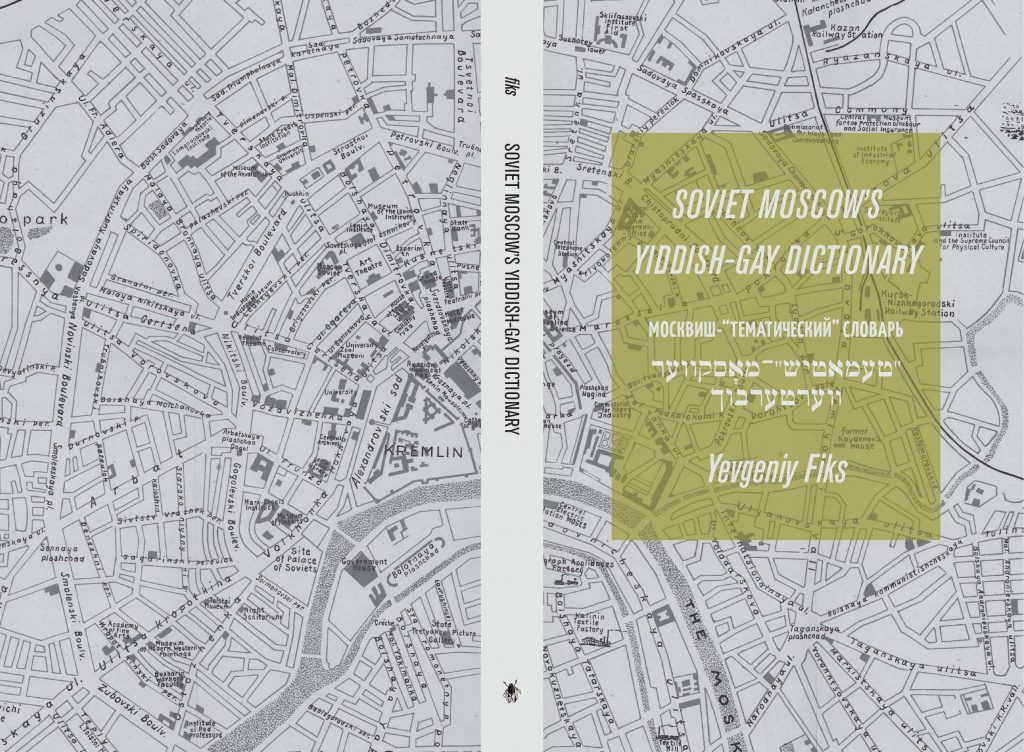 Yevgeniy Fiks’ artist’s edition “Soviet Moscow’s Yiddish-Gay Dictionary” just arrived from the printer. It will go on sale tonight as part of Yevgeniy’s exhibition Pleshka-Birobidzhan at Station Independent Projects.
Yevgeniy Fiks’ artist’s edition “Soviet Moscow’s Yiddish-Gay Dictionary” just arrived from the printer. It will go on sale tonight as part of Yevgeniy’s exhibition Pleshka-Birobidzhan at Station Independent Projects.
Order here: http://www.cicadapress.net/products-page/
 Yevgeniy Fiks from the books introduction:
Yevgeniy Fiks from the books introduction:
This book attempts to draw connections, at times contradictory and counterintuitive, between two marginal communities in Soviet-era Moscow – Jews and gays – in order to reflect on the (dis)similarities of their oppression, identity, self-irony, and practices (or hypothetical practices) of solidarity. This imagined dictionary for Soviet Jewish-Soviet Gay communication is a project that resists oversimplification, forced universality, and the erasure of difference when it comes to the Soviet experience and the Soviet subject.
[…]
This book is an artist’s project and not an academic study. I am not a linguist and although I am personally part of both the gay and Jewish communities of Moscow, my “Moskvish” and my “Tematicheskiy” are far from fluent. My work here is a combination of research, translation, transliteration, and fiction. It is a personal gesture and I own and embrace my grammar mistakes and mistranslations as organic to the construction, and lived experience, of my own identity.
I am not seeking equivalencies between these two unique and historically different communities on the margins of Soviet society. What is important is not to equate Soviet Gay and Soviet Jewish culture, language, and experience, but to see them in relation to one another. If the goal of a dictionary is to facilitate understanding between speakers of different languages, then the goal of this particular dictionary is solidarity.
This edition will go up for sale online at the conclusion of the gallery exhibition.
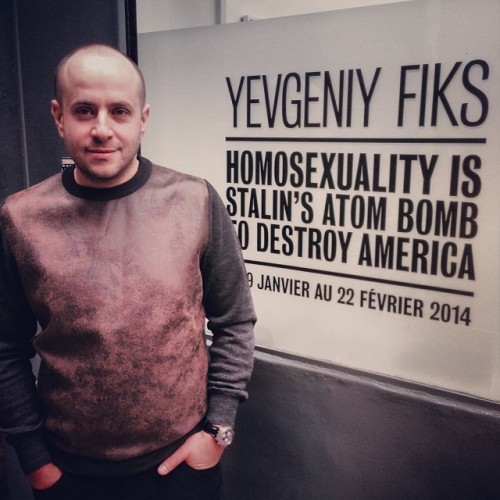 We’re currently collaborating with artist Yevgeniy Fiks on an artist’s edition for his upcoming November show “Pleshka-Birobidzhan” at Station Independent Projects. The work takes the form of a phrasebook/dictionary mapping the (un)likely intersection of Soviet Gay slang and Soviet Yiddish. Stay tuned for info about the book as well as on the exhibition.
We’re currently collaborating with artist Yevgeniy Fiks on an artist’s edition for his upcoming November show “Pleshka-Birobidzhan” at Station Independent Projects. The work takes the form of a phrasebook/dictionary mapping the (un)likely intersection of Soviet Gay slang and Soviet Yiddish. Stay tuned for info about the book as well as on the exhibition.
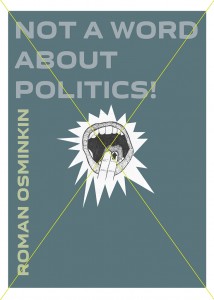 We’re excited to announce the upcoming release of Roman Osminkin’s first English language collection of poems and songs entitled “Not A Word About Politics!”
We’re excited to announce the upcoming release of Roman Osminkin’s first English language collection of poems and songs entitled “Not A Word About Politics!”
This edition is a truly collaborative endeavor between artists, writers, and translators spanning East to West. Accordingly, the edition is double facing with both Russian originals and their English translations.
The New York release is scheduled for April 7th, where Roman will be performing and reading from the book at The Sunview Luncheonette. Expect music, ultra-left R&B, and velvet crooning in an egalitarian key.
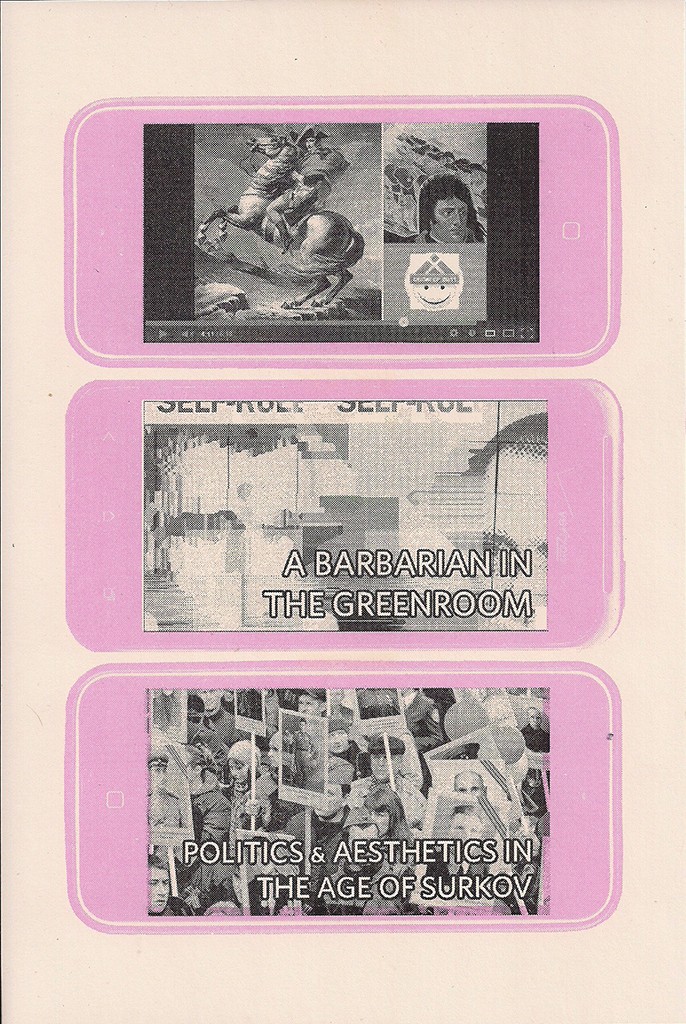
Cicada Press editors Matthew Whitley and Anastasiya Osipova recently created a micropublication and risograph series of prints for the show “Vertical Reach: Political Protest and the Militant Aesthetic Now,” hosted by Artspace in New Haven. The edition, entitled “A Barbarian in the Greenroom: Politics and Aesthetics in the Age of Surkov,” consists of 2 large installation prints, along with 12 packaged prints and accompanying texts, as a sort of bestiary of contemporary political concepts, tactics and strategies. All can be loosely tied to Kremlin ideologue and strategist Vladislav Surkov, who is taken as the publication’s skeletal core and anti-hero.
From the introductory text:
I fear that we’ve chosen too soft of a target by focusing on this man. The baby fat clings to his cheeks. His face is overripe. He is a low-hanging fruit, a perfect cliché of a postmodern puppet master, a caricature that arrived to Russia with a ten-year delay and was embraced with full provincial abandon. In truth, we find nothing spectacular about his character and could not care less about his moral qualms, his guilt and the ironic self-consciousness that he parades in his poems and novels (the man is a sentimental bastard). But we hope to make use of his skeleton. If Surkov were to be transposed to a fashion runway you would say that he has a perfect model’s body, anything you dress him with hangs beautifully and he doesn’t distract from the clothes. And when speaking of the convergence of politics and aesthetics Surkov is an ideal dress form.
He has been, at different times: a Chechen child named Aslambek Dudaev, a student of theater direction, a body guard, an advertising expert, a public relations chief, a TV director, a novelist, a lyricist, an apparatchik, and a chief Kremlin advisor. An aspiring hipster that gained a position of power from which to translate his adolescent fascination with Borges into reality show politics, he has come to be known as Putin’s “Grey Cardinal.”
We readily recognize him in Vavilen Tatarskiy, the protagonist of Vladimir Pelevin’s Generation P, who makes a breathtaking ascent from the dredges of the literary and esoterically-minded (and, of course, very hungry) intelligentsia, to the rarified elevations of media power, run by a secret cabal all too aware of their own doom. Between Pelevin’s and his own writings (published under the pseudonym of Natan Dubovitsky), Surkov the man disappears, leaving in his place only a living hero by “a dead author,” a figure of literature/art turned politics, without any claims for truth or essentiality. A knock-off boy band effigy.
In the midst of this rhetorical free jazz, all the machinery that manufactures and stylizes politics is laid bare and is paraded without false modesty. A tapestry cut from a swathe of dazzle camouflage fabric – all the deception effective despite being displayed glaringly in the open.
It is this that we find pleasurable, even instructive. The mechanisms of self-aesthecization, the ability to wear many faces to amplify the struggle, the construction and deconstruction of heroes, the capacity to string up new sub cultures by fishing line and a vulgar graphic. In the States, with the collapse of the tribally organized anti-globe movement, we have presently neither the earnestness for ideological struggle nor the romanticism needed for noble suffering. In contemporary Russia, Eduard Limonov, leader of the banned National Bolshevik party, has said, “there is no longer left and right, but the system and those who are against the system.” Limonov speaks with stupidity, but a desperate stupidity stated with a force equal to the ethereal repression that we face. Because we cannot locate the nodes of power, we attack on every front, and represent everything low and reviled. So begins the war of symbols.
A selection from the writing on the concept of “nonlinear warfare:”
A war whose command and control center is the end suite of a freshly cleaned Motel Six. Non-linear war is the conflict of the traveling salesman, the master of liminal space. Here he is at border control, that familiar scene where you stand under the nervous fluorescence and thumb your passport, trying to recall whether you are or are not a criminal, a saboteur. Customs reassures him without sentiment. They tell him that it turns out he is, in fact, a plumber. Relieved, he passes through and politely contacts his sleeper cell from the airport terminal. Subject line: HARDER & STRONGER – KEYSTONE PIPELINE OF VIAGRA ++, BEST ONLINE PHARMS!
We are making sample scans of the publication freely available for download: here, or by clicking on the title image above. Paper copies, prints, and a properly color corrected high resolution digital edition will be made available at the conclusion of the exhibition.
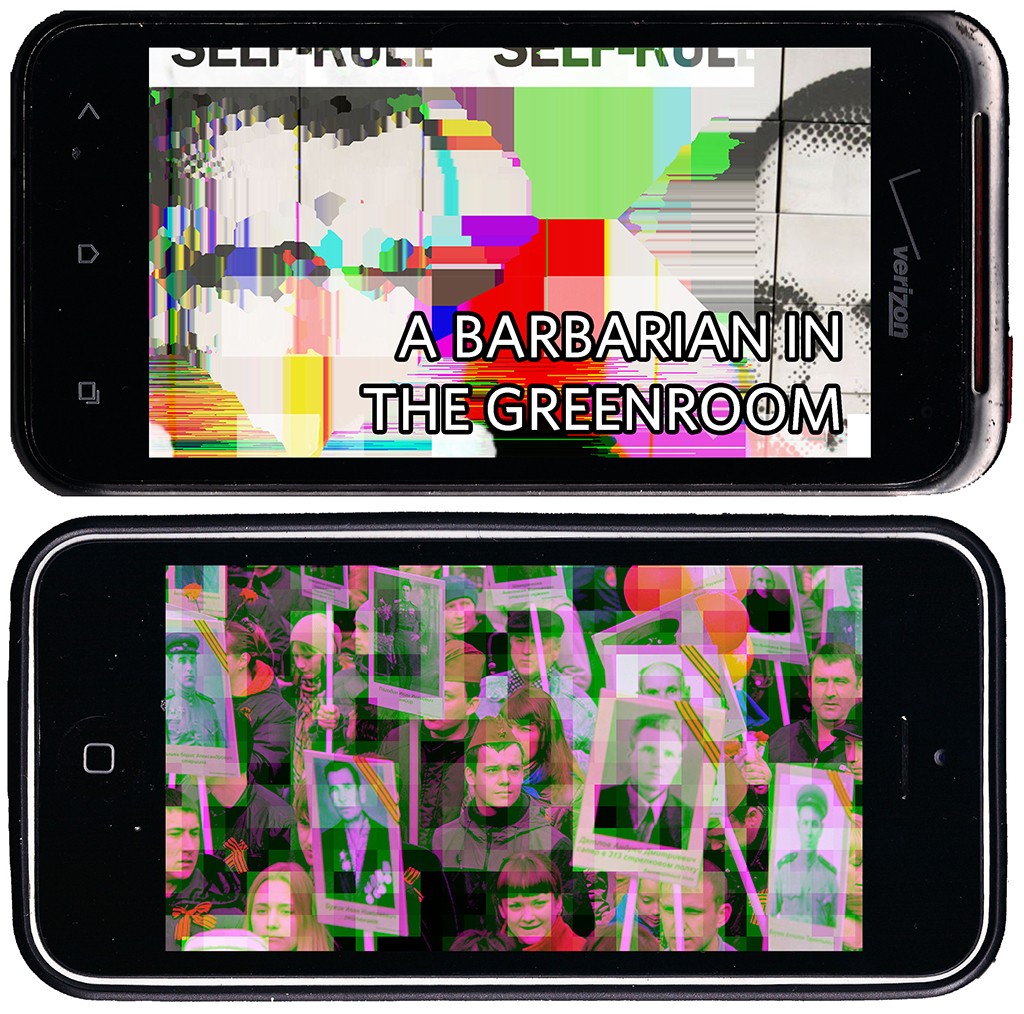 Cicada Press editors Matthew Whitley and Anastasiya Osipova will be taking part in the exhibition Vertical Reach: Political Protest and the Militant Aesthetic Now at Artspace (New Haven). As a part of the exhibition they (in fact we) will be producing a limited run of works on paper, ultimately to be bound and distributed as an artists book, on the topic of Politics in the Age of Surkov.
Cicada Press editors Matthew Whitley and Anastasiya Osipova will be taking part in the exhibition Vertical Reach: Political Protest and the Militant Aesthetic Now at Artspace (New Haven). As a part of the exhibition they (in fact we) will be producing a limited run of works on paper, ultimately to be bound and distributed as an artists book, on the topic of Politics in the Age of Surkov.
The exhibition will begin February 20th, and culminate on April 19th with poetry readings and our own multimedia lecture. A number of friends and artists that we respect immensely will be participating, including Nikita Kadan, Gregory Sholette, Pavel Arsenev, Chto Delat? and more.
Come out to New Haven if you have the opportunity.
We’re excited to announce that, despite an apparent lull, we have several books in the works for 2015. The first of which is likely to be a short collection of late Attila Kotányi, (Hungarian philosopher, poet and former Situationist International member) articles and speeches, accompanied by commentary by and conversation with Christophe Kotányi and Harout Simonian.
Attila continued to write, teach and work well past his break with the S.I. He passed away in 2003.
All thanks go to his son Christophe Kotányi and Harout Simonian for organizing and editing the project.
Through Maidan and Beyond is opening next week, November 17, at 1 Museumplatz in Vienna. The exhibition will feature our publication “Circling the Square” along with a number of its contributors.
Images of work and the catalogue to come!
Anastasiya gave a brief interview regarding our publication Circling the Square to the Ukrainian newspaper “Day” while in Kiev. The text has been roughly translated into English.
“On the whole, Maidan & Cultural Insurgency in Ukraine is a worthy publication: not only is it a kind of textbook for foreigners dedicated to the topic “everything you wanted to know about Maidan, but didn’t know where to ask,” but also one of the so far innumerous attempts to ponder over the revolutionary events in terms of the history of culture and art.”
Follow the link below to read the full article:
Cicada, like Zelig, will be appearing throughout the world this September.
First engagement, the Floating Library is afloat! and hosting a number of Cicada rags, along with friends from Ugly Duckling Presse, Interference Archive, Franklin Furnace, the Luncheonette and SeaChange. It can be found aboard the Lilac steamship on Pier 25 in downtown Manhattan. Also, duo Colleen Asper and Marika Kandelaki will be performing Medea as a part of their long running Hole series on September 26th.
Check out the Floating Library’s schedule here.
Second, we will be participating in the Brooklyn Book Festival this week on Sunday, September 21st. The festival will be running from 10-6 at Brooklyn Borough Hall, rain or shine. All of our current publications will be available, along with artists’ editions and other printed work. There are a huger number of authors and artists speaking as part of the festival’s events, including a PEN panel on writing and surveillance that is apropos our most recent publication on Ukraine’s Maidan uprising, and an appearance by New Weird’s Jeff VanderMeer.
The schedule is here.
And, most dear to us, Anastasiya is in Ukraine at the peak of the current crisis, as both a foreign agent and a native provocateur in the reigning climate of war and ultra-nationalism. She’ll be waving the blackened Cicada banner tomorrow at a new space in Kiev intended as a site for the collective HUDRADA. Nastiya will be speaking on “Circling the Square: Maidan and Cultural Insurgency in Ukraine,” discussing the current process of museumification of protest and the role of cultural institutions in shaping critical consciousness in the face of war and propaganda. She will be joined by a number of contributors to the publication.
Facebook event: CtS HUDRADA (scroll way down for English)
September 17th, 6:30 PM, 34 Khreshchatyk.